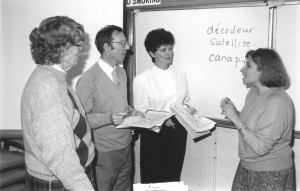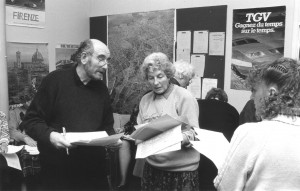Happy birthday languages at the OU!
Twenty years of teaching foreign languages at the Open University was marked on 29 September by an afternoon of celebrations at Walton Hall.
Following an introduction and video message from the Vice‐Chancellor of the Open University, Martin Bean, there were a few words from Pro‐Vice‐Chancellor Prof Alan Tait about ‘Languages at the Open University’ and a talk ‘ Language skills and the UK’s future growth prospects’ from Dr Adam Marshall of the British Chambers of Commerce.
Prof Marie‐Noëlle Lamy recalled ‘How it all began – the founding of the Centre for Modern Languages’. This was followed by messages from OU and external colleagues and from partners and students. Margaret Nicolson spoke about ‘The nations and regions: then and now’ and Dr Regine Hampel about ‘Research and scholarship in the Department of Languages’.
Staff from the Department of Languages then presented a few learning applications, including interactive learning on the move, technology for sharing, and technology for developing speaking skills at a distance before Dr Uwe Baumann considered ‘The next twenty years’. There followed a reception and opportunity to try out some of the technology.
In 1968, before the University’s foundation, The Open University Planning Committee specifically dropped plans for teaching languages from the Advisory Committee proposals. According to Walter Perry in Open University: A personal account by the first Vice-Chancellor, there were three reasons for this:
first because of the large number of courses that each language would pre-empt, second because university language teaching normally assumes a knowledge of the language as an entry qualification which would be contrary to the principles of open entry, and third because conversational language courses are well provided for by the Further Education Advisory Council of the BBC.
The 1980s had seen discussions progress about the teaching of modern languages, despite the reservations of the Visiting Committee. In 1983, the first Professor of European Humanities Studies was appointed and a working party on new initiatives in modern language teaching was set up including experts from within and outside the University. However, in 1985 the University’s first proposed language course on Understanding German was abandoned due to lack of resources and the decade concluded with no language courses offered. 
Modern languages were finally introduced to the OU’s curriculum by establishing the former Centre for Modern Languages in 1991. Its first task was to produce an intermediate French course at Level 1 which was then followed by creating courses in French, German and Spanish which led to the award of OU Diplomas. The then Centre for Modern Languages has been at the forefront of using technology for language teaching since its inception.
The Department of Languages is now the largest language department in the UK in terms of student numbers. It is part of the Faculty of Education and Language Studies, which was created though an amalgamation of the School of Education and the Centre for Modern Languages in September 2000.
